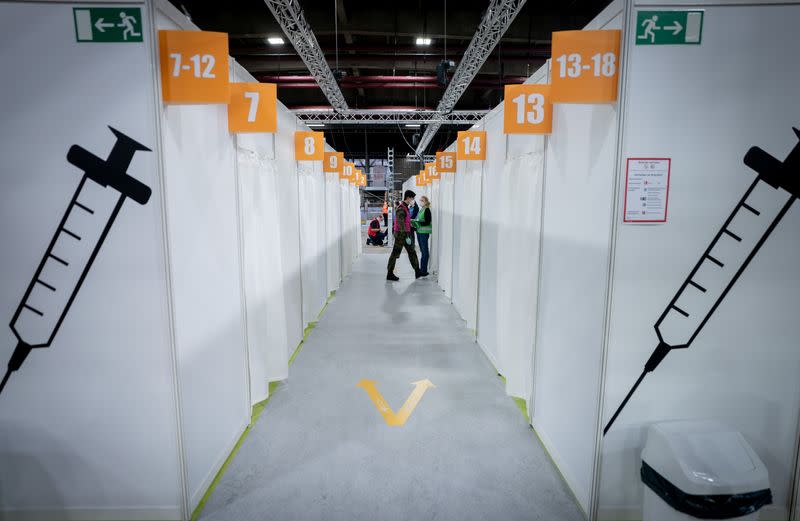Berlin earmarks 9 billion euros to buy COVID-19 shots for Europeans
By Michael Nienaber
BERLIN (Reuters) - Germany is planning to spend nearly 9 billion euros ($10.9 billion) this year to help procure up to 635.1 million COVID-19 vaccination shots for its population and other EU member states, a finance ministry document seen by Reuters showed on Tuesday.
Delays to the EU's vaccine roll-out and concerns about new coronavirus variants are making it harder for Berlin and other European governments to ease pandemic restrictions. The hiccups have caused some tensions between Brussels and Berlin.
Finance Minister Olaf Scholz's deputy Bettina Hagedorn proposed to lawmakers in a letter that they should approve a request by Health Minister Jens Spahn for an additional 6.22 billion euros to buy more doses, according to the document.
This comes on top of 2.66 billion euros already earmarked in the 2021 budget.
The additional spending plans come after Scholz told the BBC over the weekend that he was angry that more COVID-19 vaccines were not ordered last year at a European level while EU chief executive Ursula von der Leyen renewed her defence of the European Commission's record on rolling them out.
A coalition source told Reuters the Bundestag lower house of parliament's budget committee was expected to approve the additional spending on Wednesday.
"For the federal government, obtaining COVID-19 vaccines is of fundamental importance to get the pandemic under control," Hagedorn told lawmakers in the letter.
"In addition, a broad portfolio (of vaccines) is required so that Germany will have effective vaccines with enough vaccine doses for the various population groups, also in the case that not all vaccines are approved," she added.
The Health Ministry will use the total funds of 8.89 billion euros to buy up to 635.1 million vaccine doses as part of the European Union's joint procurement plan and Berlin's national efforts to secure additional shots, the document said.
All EU member states have agreed to procure vaccines under the bloc's joint plan in an attempt to avoid a race among member states which could have left poorer countries with fewer doses.
A German health ministry spokesman said Berlin would use 456 million euros of the overall 8.89 billion euros to procure vaccine doses in bilateral agreements with companies. The lion's share would be used as part of the EU procurement plan.
Under the EU agreement, member states are not allowed to conduct parallel talks and sign side deals with vaccine makers who negotiate with the EU.
(Reporting by Michael Nienaber; Additional reporting by Francesco Guarascio in Brussels and Andreas Rinke in Berlin; Editing by Caroline Copley and Alison Williams)

 Yahoo News
Yahoo News 

